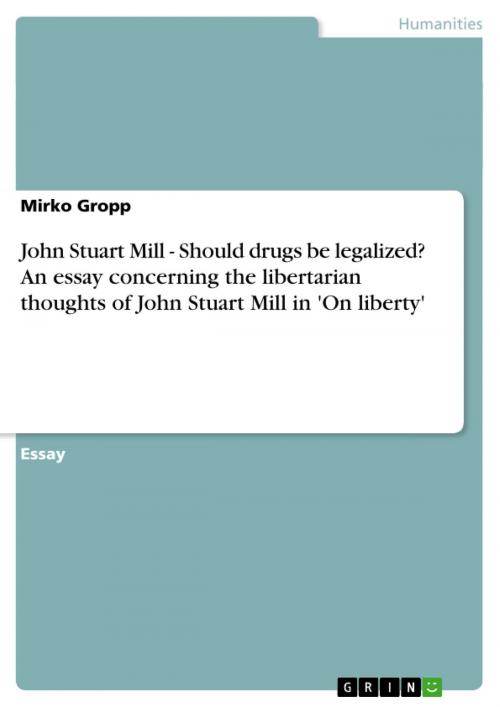John Stuart Mill - Should drugs be legalized? An essay concerning the libertarian thoughts of John Stuart Mill in 'On liberty'
Should drugs be legalized? An essay concerning the libertarian thoughts of John Stuart Mill in 'On liberty'
Nonfiction, Religion & Spirituality, Philosophy, Modern| Author: | Mirko Gropp | ISBN: | 9783638137379 |
| Publisher: | GRIN Publishing | Publication: | August 8, 2002 |
| Imprint: | GRIN Publishing | Language: | English |
| Author: | Mirko Gropp |
| ISBN: | 9783638137379 |
| Publisher: | GRIN Publishing |
| Publication: | August 8, 2002 |
| Imprint: | GRIN Publishing |
| Language: | English |
Essay from the year 2002 in the subject Philosophy - Philosophy of the 19th Century, grade: 1,3 (A), University of Bayreuth (Philosophy Faculty), course: Mill - On liberty, 1 entries in the bibliography, language: English, abstract: The usage of substances which have an effect on biological processes inside the body were always a part of the human culture. They can be used to cure diseases such in the case of aspirin and on the other hand they are used for recreational purposes such as alcohol. This essay will concentrate on the latter practice which is facing a lot of debates and criticism. Whilst it is pretty common amongst native tribes to make use of this kind of drugs, in civilized countries you will find nearly everywhere paternalistic regulations in the case of non-accepted drugs, which is often a 'Zero-Tolerance' policy such in Asia and the USA. On the other hand, socially accepted drugs like alcohol, nicotine, caffeine, and prescriptive drugs such as Prozak are part of the daily life. As we can see, the policy according to recreational drugs is inconsistent, mixing arguments of a liberal and paternalistic approach. In arguments against this historically based segregated treatment of recreational drugs, you will often find the thoughts of the nineteenth century philosopher John Stuart Mill concerning 'Civil or Social Liberty: the nature and limits of the power which can be legitimately exercised over the individual '. The argument for the legalization of drugs often bases on 'harm-principle', the decisive scheme of his work, trying to combine Utilitarianism and Liberalism. In his view, giving priority to liberty over other goods and even over the claims of general welfare will on the long run best promote general welfare. Hence, the following work examines on 5 pages whether drugs interfere with the interest of others or better saying whether they are harming them in the light of Mill's concept.
Essay from the year 2002 in the subject Philosophy - Philosophy of the 19th Century, grade: 1,3 (A), University of Bayreuth (Philosophy Faculty), course: Mill - On liberty, 1 entries in the bibliography, language: English, abstract: The usage of substances which have an effect on biological processes inside the body were always a part of the human culture. They can be used to cure diseases such in the case of aspirin and on the other hand they are used for recreational purposes such as alcohol. This essay will concentrate on the latter practice which is facing a lot of debates and criticism. Whilst it is pretty common amongst native tribes to make use of this kind of drugs, in civilized countries you will find nearly everywhere paternalistic regulations in the case of non-accepted drugs, which is often a 'Zero-Tolerance' policy such in Asia and the USA. On the other hand, socially accepted drugs like alcohol, nicotine, caffeine, and prescriptive drugs such as Prozak are part of the daily life. As we can see, the policy according to recreational drugs is inconsistent, mixing arguments of a liberal and paternalistic approach. In arguments against this historically based segregated treatment of recreational drugs, you will often find the thoughts of the nineteenth century philosopher John Stuart Mill concerning 'Civil or Social Liberty: the nature and limits of the power which can be legitimately exercised over the individual '. The argument for the legalization of drugs often bases on 'harm-principle', the decisive scheme of his work, trying to combine Utilitarianism and Liberalism. In his view, giving priority to liberty over other goods and even over the claims of general welfare will on the long run best promote general welfare. Hence, the following work examines on 5 pages whether drugs interfere with the interest of others or better saying whether they are harming them in the light of Mill's concept.















